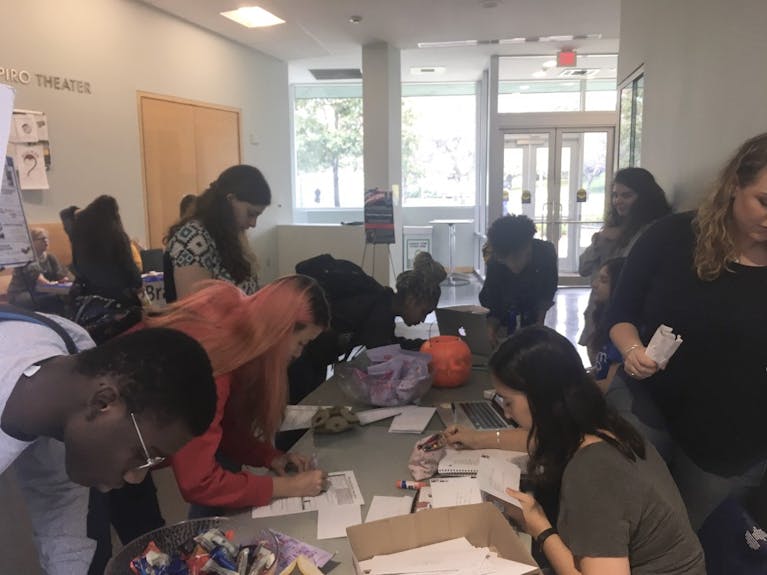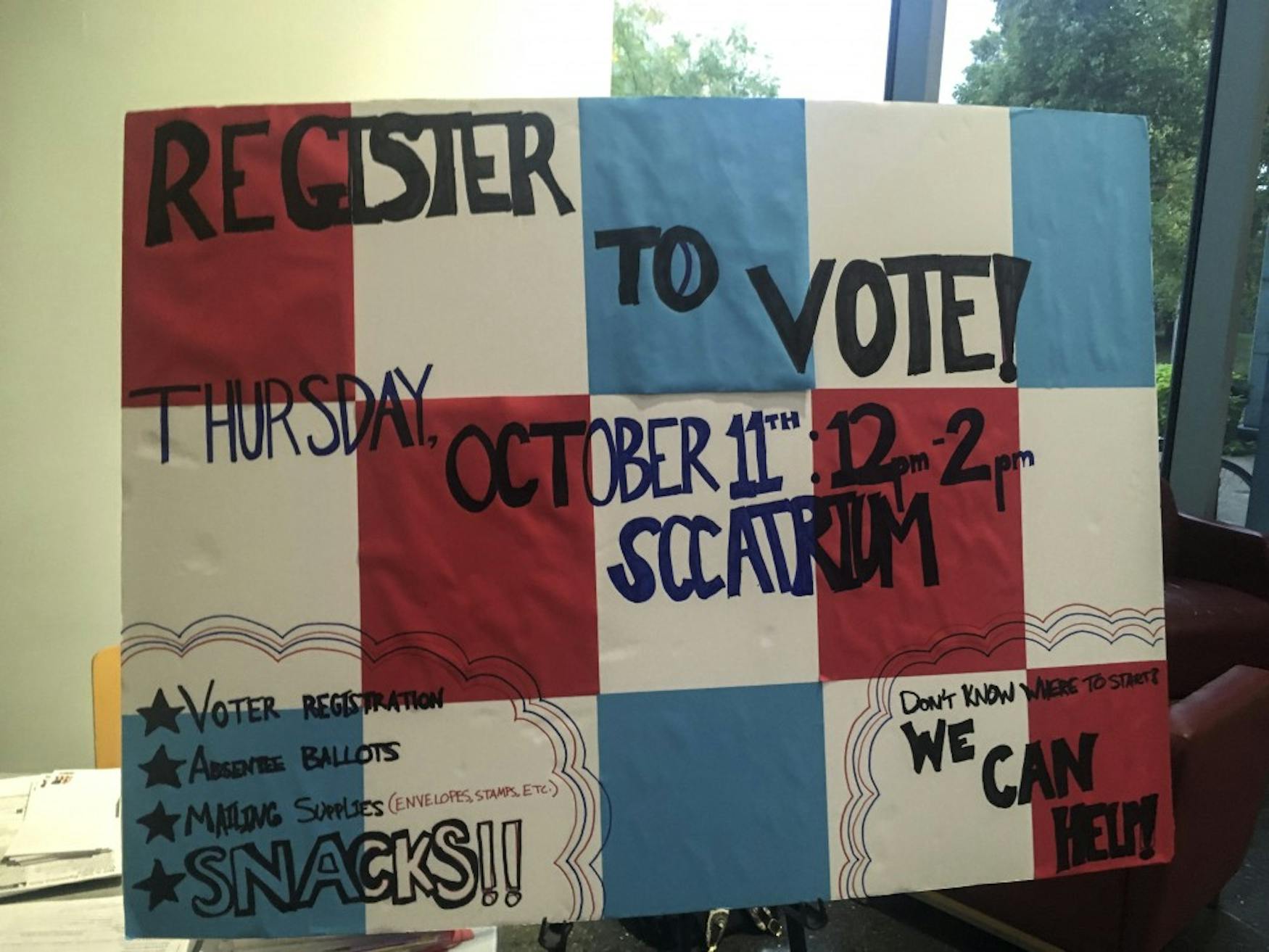It’s time to vote!
Dozens of Brandeis students registered to vote this week
At the entrance of the Shapiro Campus Center atrium last Thursday, two long, gray tables were stretched out, filled with candy, snacks and boxes of white envelopes. At the end of the tables, a blue, red, and white-checkered sign read, “Register to Vote!”
Popcorn in hand, volunteers sat chatting with a long line of students as they filled out voter registration forms and put stamps on finished envelopes.
Sponsored by the Sociology Department, the Peace, Conflict and Coexistence program, and the Social Justice and Social Policy Program, the voter registration drive guided students in registering or getting an absentee ballot, enticing students to learn about civic engagement. Rachel Lederer ’19 and Zosia Buse ’20 organized the event and shared their desire to help students take part in the voting process.
“It’s really important to help students vote. It’s a really important group of votes, especially because lots of students don’t end up voting because it’s harder logistically. You need to request absentee ballots and they are registered in different states, so it can be a complicated process. I just wanted to make it as easy as possible for people and make sure everyone has a say and is able to exercise their right to vote,” said Lederer.

GET ENFRANCHISED: “I think it’s always important to vote, regardless of what the political climate is,” said Lauren Komer ’21.
Buse emphasized, “We are nonpartisan; we’re just encouraging people to engage in the civic process, not to push any certain platform or certain candidates. We’re just getting people out and to understand how easy it is to vote, because voting absentee can be kind of daunting when you don’t know how to apply or what to do. But it’s really an easy process.”
Over 60 students from all class years came to claim absentee ballots from over 20 different states ranging from Georgia to California. And although many emphasized the importance of voting each year, some students discussed how current events have added increasing pressure to vote.
“Before 2014, I don’t think anyone cared too much about politics except for people directly affected by politics and niche sides, but then after a certain period of time, I don’t know when, but it started to become toxic and not about politics at all. … I just thought I really hate how it is right now, and you know people died to be able to vote, so I should do it,” said Robbie Chen ’22.
As two friends, Lauren Komer ’21 and Norma Stobbe ’20, finished receiving their absentee ballots, they shared how easy the voting process was with people helping them through it; they also expressed hope that more students would take part and consider the effects of their vote.
“I think it’s always important to vote regardless of what the political climate is, but I think right now there’s a lot of pressure around voting — which is good, because the rates of voting in the U.S. are not what they should be. So if the political climate right now is pressuring people to vote, then maybe that’s a good thing,” shared Komer. She added, “Please do it [vote]. Just take into account that there are other people’s lives, and the decisions that are being made in higher levels of the political system not only affect yourself, but other people.”
Although many students expressed dismay regarding the current national state of politics, some also stressed the importance of taking part in local elections and becoming aware of the events happening in the local community.
“I think voter turnout goes down in the midterms when it’s not a presidential election because people are paying less attention,” said Buse, “But it’s really important to be aware of statewide elections because the Senate and Congress really have a big say in how our government works. It’s really important to remain aware even when it’s not a presidential election, so it’s great to see students involved and excited.”
Many students expressed their interest in their local communities and the elections that affect their home states. One student spoke about what was at stake the in upcoming election for their home state of Georgia.
“There’s no House or Senate vote, but we’re voting for governor and there’s a chance it could go blue, but she’s probably not going to win. But it’s important,” said Joseph Coles ’22. “I mean, if you don’t vote I understand, but you should know everything and get all the facts and then decide if you want to vote or not. You should just be informed.”
Whether or not they felt personally well-informed on the current topics on the ballot, students emphasized the importance of doing research and listening to various perspectives on political news. The sources students utilized for information included the news articles, emails, social media and websites such as the League of Women Voters.
“Not as much as I want to, but yeah, I think I’m more versed in politics than the general public. My father is a professor, and he tells me what’s going on a lot of times. … I also read news articles; I listen to news shows like Rachel Maddow and Democracy Now. And other times, when I want to have fun but still learn, I watch Stephen Colbert and Seth Meyers,” mused Kwesi Jones ’21.
As the afternoon passed, the cluster of students by the vote registration drive remained. And as the vote registration drive came to an end, a Hillel booth opened to assist students in the voting process. Hillel takes part in the “MitzVote” campaign, offering another resource for students to vote on the Brandeis campus.
“Even if people aren’t able to make it today, I encourage them to vote. There’s Vote.org and lots of different resources for requesting absentee ballots. And it’s not too late to do that in any state,” said Lederer.
The undergraduate representatives urged students to take advantage of all the resources available, including the detailed library research guide on voting online and the library front desk where materials for mailing absentee ballots will also be provided. One thing all the students who spoke with the Justice agreed upon was that this November, the stakes are too high to stay home.




Please note All comments are eligible for publication in The Justice.